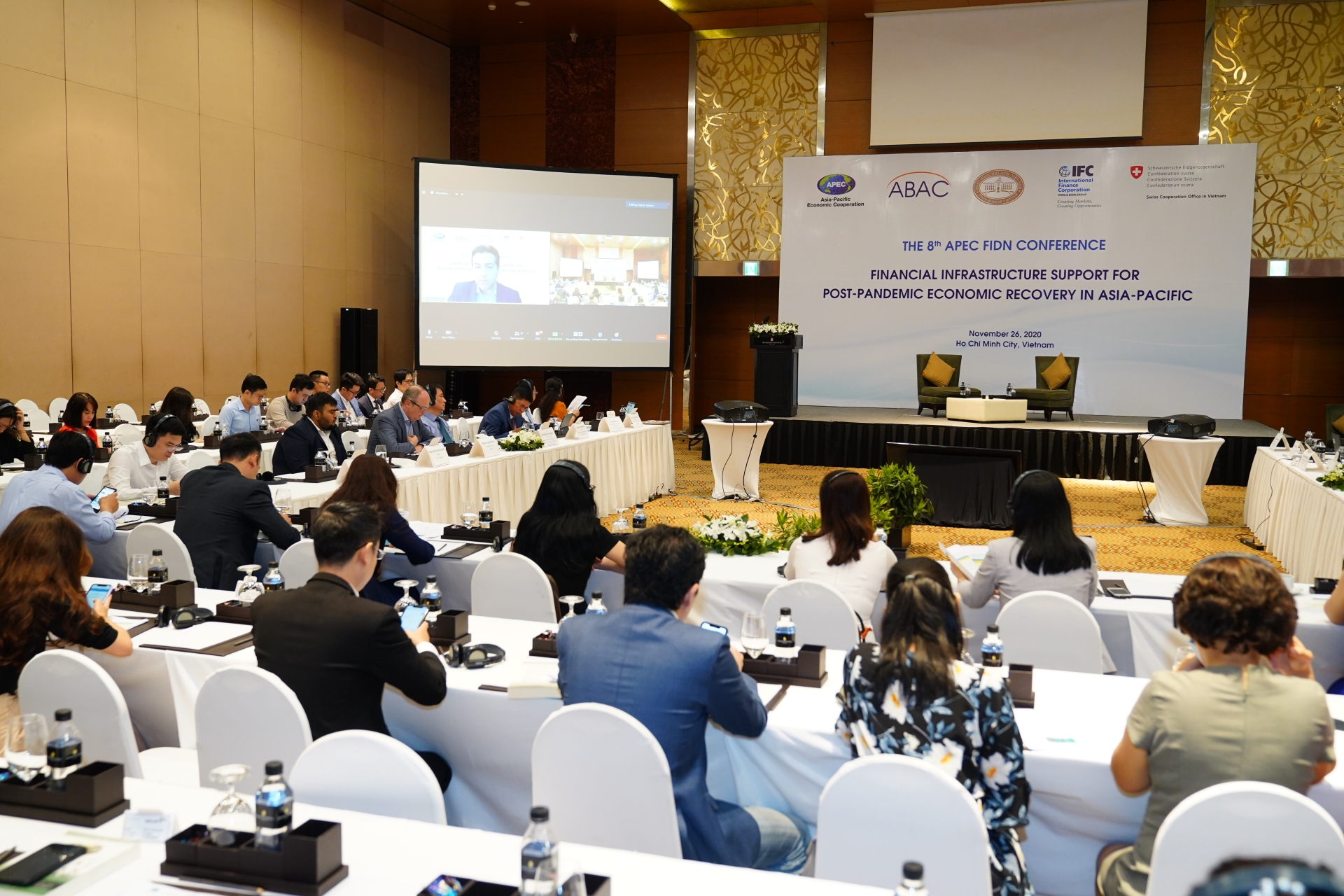Financial infrastructure support for post-pandemic economic recovery in Asia-Pacific
 |
| The eighth APEC Financial Infrastructure Development Network Conference is held on November 26 |
To be held both virtually and physically (for those based in Vietnam) in Ho Chi Minh City, this year’s event focused on the theme of “Financial Infrastructure Support for Post-Pandemic Economic Recovery in Asia-Pacific”.
About 150 representatives from ministries and other government agencies, think-tank organisations, and financial institutions, value chain lead firms, suppliers, and distributors across the Asia-Pacific region attended the event. Speakers from APEC members countries shared their thoughts and led discussions on how to enable policies to expand financing for participation of micro-, small-, and medium-sized enterprises (MSMEs) in supply chains in the context of COVID-19.
In particular, the meeting discussed various issues on which policy makers in APEC developing economies are seeking technical advice – the required enabling environment for non-deposit-taking lenders (NDTLs) to support MSME finance and supply chain finance, how governments and market participants can collaborate to develop e-ID and e-KYC (Know Your Customer) services for the digital economy and digital finance including online supply chain finance (SCF), and how financial infrastructure services can support post-COVID-19 recovery in general.
“As financial markets are increasingly globalised, a more robust regional financial infrastructure network will support the development of trade among economies, thus facilitating stable economic development in each APEC economy,” Qamar Saleem, IFC Asia-Pacific manager for Financial Institutions Group Advisory Services.
“We have been partnering with the IFC, the State Bank of Vietnam, and the Ministry of Justice over the past few years to develop a movable finance market, which is essential for supply chain financing in the country. We will continue intensifying efforts to expand financing for MSMEs participating in supply chains,” said Jonash Grunder, Deputy Head of Cooperation, Embassy of Switzerland to the Socialist Republic of Vietnam.
In Vietnam, financial services are one of the critical elements for improving the competitiveness of supply chains. SCF that links buyers, suppliers, and financial institutions will enable suppliers and distributors to optimise their working capital management by converting their sales receivables and inventories to cash and giving them lower-cost financing. It will also allow suppliers to conduct more open-account transactions, making them more attractive to global buyers.
Vietnam’s foreign trade volume has increased in recent years as free-trade agreements are opening new market opportunities for local businesses. However, the lack of working capital and transaction banking services such as SCF partially hinders producers and suppliers, especially MSMEs, from accepting large orders or developing new relationships with their value chain actors. As a result, the share of receivables and inventory registered as movable collateral in Vietnam is just about 30 per cent, compared with 60 per cent in China and 80 per cent in mature markets globally.
Meanwhile, Vietnam has great potential for SCF which was estimated to reach $33 billion in 2018. However, to reach that level, there are some areas where Vietnam could have been considered deepening the market. Development of regulatory framework on SCF, participation of third-party collateral management companies, development of commercial finance companies including factoring finance companies and non-deposit taking lenders, and an e-platform for supply chain financing are among the key areas for improvements to establish an enabling ecosystem for SCF to flourish in Vietnam.
IFC, in partnership with SECO, is implementing a multi-year advisory programme to facilitate supply chain financing for Vietnamese SMEs by improving the regulatory framework, sector infrastructure, capacities of SCF providers, and awareness of SME suppliers. Increasing access to supply chain finance solutions, subsequently, will help them grow their businesses, expand into new markets, and drive Vietnam's economy.
What the stars mean:
★ Poor ★ ★ Promising ★★★ Good ★★★★ Very good ★★★★★ Exceptional
 Tag:
Tag:
Themes: Drive ASEAN Forward
Related Contents
Latest News
More News
- Private capital funds as cornerstone of IFC plans (February 20, 2026 | 14:38)
- Priorities for building credibility and momentum within Vietnamese IFCs (February 20, 2026 | 14:29)
- How Hong Kong can bridge critical financial centre gaps (February 20, 2026 | 14:22)
- All global experiences useful for Vietnam’s international financial hub (February 20, 2026 | 14:16)
- Raised ties reaffirm strategic trust (February 20, 2026 | 14:06)
- Sustained growth can translate into income gains (February 19, 2026 | 18:55)
- The vision to maintain a stable monetary policy (February 19, 2026 | 08:50)
- Banking sector faces data governance hurdles in AI transition (February 19, 2026 | 08:00)
- AI leading to shift in banking roles (February 18, 2026 | 19:54)
- Digital banking enters season of transformation (February 16, 2026 | 09:00)






















 Mobile Version
Mobile Version